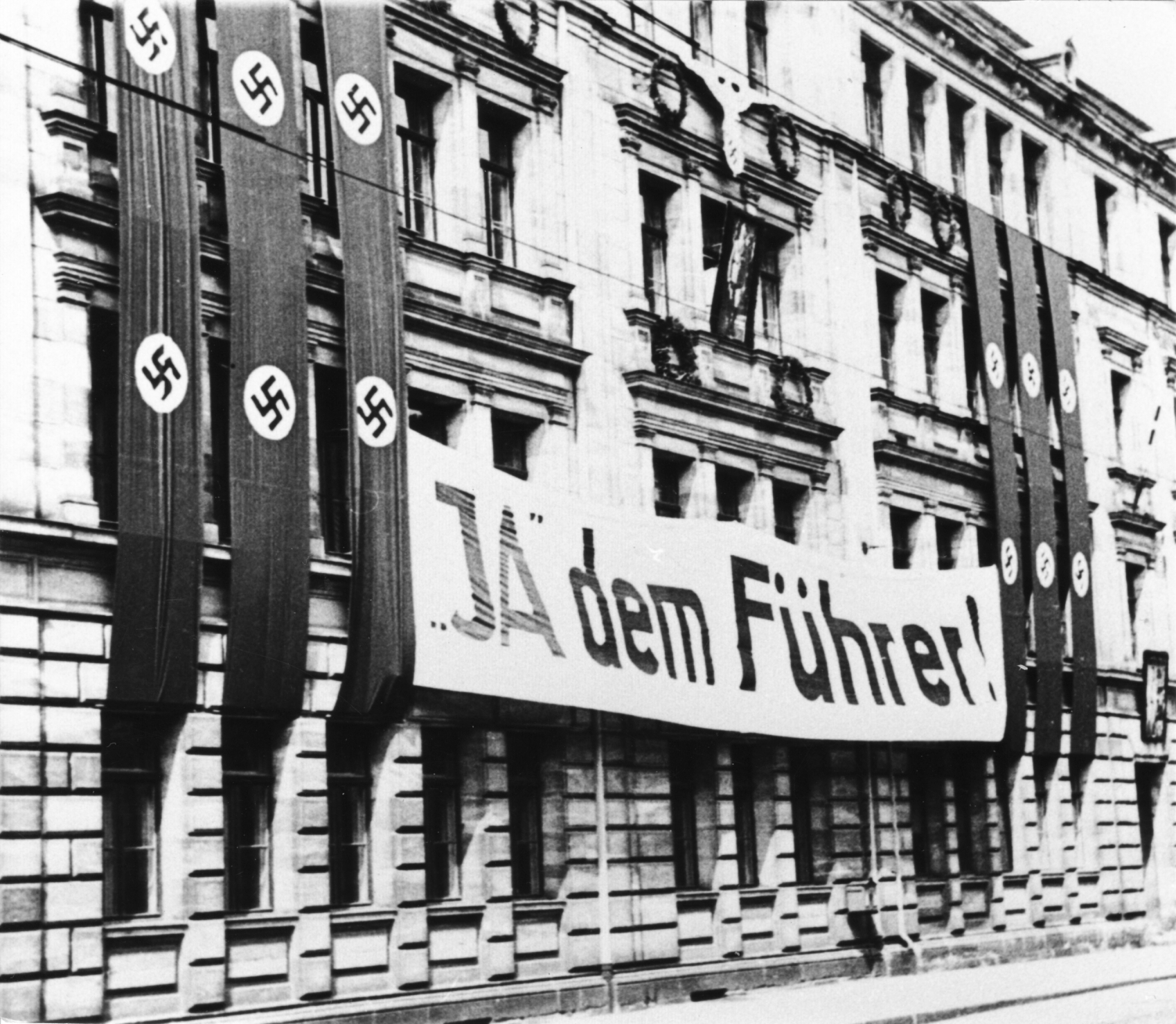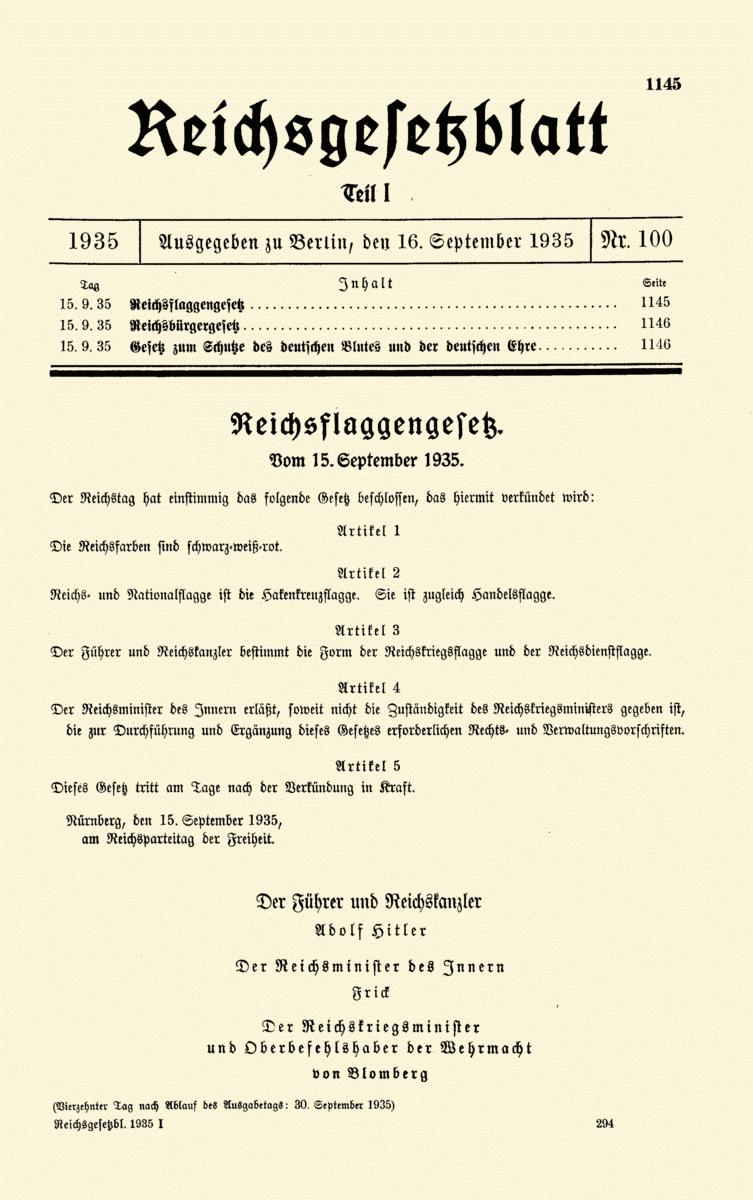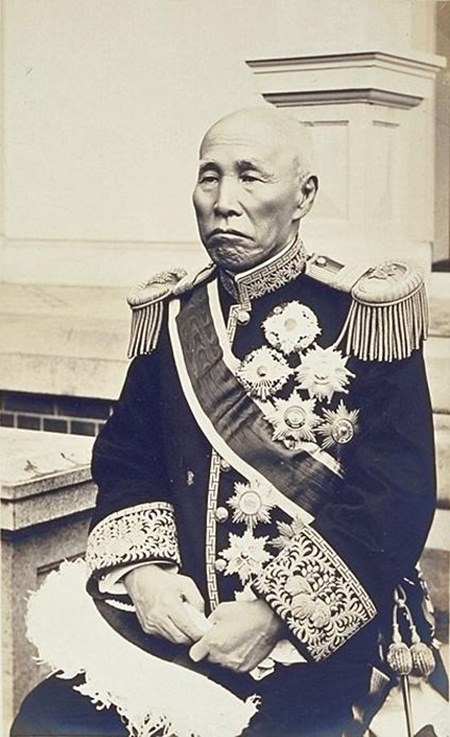|
1934 German Referendum
A referendum on merging the posts of Chancellor and President was held in Nazi Germany on 19 August 1934,Dieter Nohlen and Philip Stöver (2010) ''Elections in Europe: A Data Handbook'', p. 762, . seventeen days after the death of President Paul von Hindenburg. The German leadership sought to gain approval for Adolf Hitler's assumption of supreme power. The referendum was associated with widespread intimidation of voters, and Hitler used the resultant large "yes" vote to claim public support for his activities as the ''de facto'' head of state of Germany. In fact, he had assumed these offices and powers immediately upon Hindenburg's death and used the referendum to legitimise that move and take the title (Führer and Reich Chancellor). Background Hitler had known as early as April 1934 that Hindenburg would likely be dead by the end of the year. He spent much of the runup working to get the armed forces to support him as Hindenburg's successor.William Shirer, ''The Rise and Fall ... [...More Info...] [...Related Items...] OR: [Wikipedia] [Google] [Baidu] |
Penguin Books
Penguin Books is a British publishing house. It was co-founded in 1935 by Allen Lane with his brothers Richard and John, as a line of the publishers The Bodley Head, only becoming a separate company the following year."About Penguin – company history" , Penguin Books. Penguin revolutionised publishing in the 1930s through its inexpensive paperbacks, sold through and other stores for sixpence, bringing high-quality fictio ... [...More Info...] [...Related Items...] OR: [Wikipedia] [Google] [Baidu] |
East Prussia
East Prussia ; german: Ostpreißen, label= Low Prussian; pl, Prusy Wschodnie; lt, Rytų Prūsija was a province of the Kingdom of Prussia from 1773 to 1829 and again from 1878 (with the Kingdom itself being part of the German Empire from 1871); following World War I it formed part of the Weimar Republic's Free State of Prussia, until 1945. Its capital city was Königsberg (present-day Kaliningrad). East Prussia was the main part of the region of Prussia along the southeastern Baltic Coast. The bulk of the ancestral lands of the Baltic Old Prussians were enclosed within East Prussia. During the 13th century, the native Prussians were conquered by the crusading Teutonic Knights. After the conquest the indigenous Balts were gradually converted to Christianity. Because of Germanization and colonisation over the following centuries, Germans became the dominant ethnic group, while Masurians and Lithuanians formed minorities. From the 13th century, East Prussia was pa ... [...More Info...] [...Related Items...] OR: [Wikipedia] [Google] [Baidu] |
Nuremberg Laws
The Nuremberg Laws (german: link=no, Nürnberger Gesetze, ) were antisemitic and Racism, racist laws that were enacted in Nazi Germany on 15 September 1935, at a special meeting of the Reichstag (Nazi Germany), Reichstag convened during the annual Nuremberg Rally of the Nazi Party. The two laws were the Law for the Protection of German Blood and German Honour, which Rassenschande, forbade marriages and extramarital intercourse between Jews and Germans and the employment of German females under 45 in Jewish households; and the Reich Citizenship Law, which declared that only those of German or related blood were eligible to be Reich citizens. The remainder were classed as state subjects without any citizenship rights. A supplementary decree outlining the definition of who was Jewish was passed on 14 November, and the Reich Citizenship Law officially came into force on that date. The laws were expanded on 26 November 1935 to include Romani people, Romani and Afro-Germans, Bl ... [...More Info...] [...Related Items...] OR: [Wikipedia] [Google] [Baidu] |
November 1933 German Parliamentary Election
Parliamentary elections were held in Germany took place on 12 November 1933. They were the first since the Nazi Party seized complete power with the passage of the Enabling Act in March. All opposition parties had been banned by this time, and voters were presented with a single list containing Nazis and 22 non-party "guests" (''Gäste'') of the Nazi Party. These "guests", who included the likes of Alfred Hugenberg, still fully supported the regime of Adolf Hitler in any event. This election set the tone for all further elections and referendums held in the Nazi era. Official results showed 92 percent of the voters approved the Nazi list, on a turnout of 96 percent. The vote was held in far-from secret circumstances; many voters feared that anyone who voted "no" would be detected and punished for doing so. In some communities, voters were threatened with reprisals if they dared to vote no, or even if they simply failed to vote at all.William Shirer, ''The Rise and Fall of the Thi ... [...More Info...] [...Related Items...] OR: [Wikipedia] [Google] [Baidu] |
Electoral Fraud
Electoral fraud, sometimes referred to as election manipulation, voter fraud or vote rigging, involves illegal interference with the process of an election, either by increasing the vote share of a favored candidate, depressing the vote share of rival candidates, or both. It differs from but often goes hand-in-hand with voter suppression. What exactly constitutes electoral fraud varies from country to country. Electoral legislation outlaws many kinds of election fraud, * also at but other practices violate general laws, such as those banning assault, harassment or libel. Although technically the term "electoral fraud" covers only those acts which are illegal, the term is sometimes used to describe acts which are legal, but considered morally unacceptable, outside the spirit of an election or in violation of the principles of democracy. Show elections, featuring only one candidate, are sometimes classified as electoral fraud, although they may comply with the law and are presen ... [...More Info...] [...Related Items...] OR: [Wikipedia] [Google] [Baidu] |
Waseda University
, mottoeng = Independence of scholarship , established = 21 October 1882 , type = Private , endowment = , president = Aiji Tanaka , city = Shinjuku , state = Tokyo , country = Japan , students = 47,959 , undergrad = 39,382 , postgrad = 8,577 , faculty = 2,218 full-time3,243 part-time , administrative_staff = 1,257 full-time119 part-time , campus = Urban , former_names = Tōkyō Senmon Gakkō , colors = Maroon , free_label = Athletics , free = 43 varsity teams , affiliations = Universitas 21APRU URA AALAU , mascot = Waseda Bear , website = , footnotes = , address = , logo = , module = , abbreviated as , is a private research university in Shinjuku, Tokyo. Founded in 1882 as the ''Tōkyō Senmon Gakkō'' by Ōkuma Shigenobu, the school was formally renamed Waseda University in 1902. The university has numerous notable alumni, including nine prime ministers of Japan, a number of important figures of Japanese literature, including Haruki Murakami ... [...More Info...] [...Related Items...] OR: [Wikipedia] [Google] [Baidu] |
Heinrich August Winkler
Heinrich August Winkler (born 19 December 1938 in Königsberg) is a German historian. With his mother he joined the westward flight in 1944, after which he grew up in southern Germany, attending a Gymnasium in Ulm. He then studied history, political science, philosophy and public law at Münster, Heidelberg and Tübingen. In 1970 he became professor at the Free University of Berlin. From 1972 to 1991 he was professor at the University of Freiburg. Since 1991 he has held a chair of modern history at the Humboldt University Berlin. He has been a member of the Social Democratic Party of Germany (SPD) since 1962, and has ties to numerous prominent politicians within that party, including former Chancellor Gerhard Schröder. He is the author of a book detailing a comprehensive political history of the Weimar Republic, among others. During the ''Historikerstreit,'' Winkler was a leading critic of Ernst Nolte.Winkler, Heinrich August “Eternally in the Shadow of Hitler?” pages 171� ... [...More Info...] [...Related Items...] OR: [Wikipedia] [Google] [Baidu] |
Franz Von Papen
Franz Joseph Hermann Michael Maria von Papen, Erbsälzer zu Werl und Neuwerk (; 29 October 18792 May 1969) was a German conservative politician, diplomat, Prussian nobleman and General Staff officer. He served as the chancellor of Germany in 1932, and then as the vice-chancellor under Adolf Hitler from 1933 to 1934. Born into a wealthy family of Westphalian Catholic aristocrats, Papen served in the Prussian Army from 1898 onward and was trained as a German General Staff officer. He served as military attaché in Mexico and the United States from 1913 to 1915, organising acts of sabotage in the United States and financing Mexican forces in the Mexican Revolution. After being expelled from the United States in 1915, he served as a battalion commander on the Western Front of World War I and finished his war service in the Middle Eastern theatre as a lieutenant colonel. Appointed chancellor in 1932 by President Paul von Hindenburg, Papen ruled by presidential decree. H ... [...More Info...] [...Related Items...] OR: [Wikipedia] [Google] [Baidu] |
Oskar Von Hindenburg
Oskar Wilhelm Robert Paul Ludwig Hellmuth von Beneckendorff und von Hindenburg (31 January 1883 – 12 February 1960) was a German ''Generalleutnant''. The son and aide-de-camp to Field Marshal and Reich President Paul von Hindenburg had considerable influence on the appointment of Adolf Hitler as German chancellor in January 1933. Early life Oskar von Hindenburg was born in Königsberg, East Prussia (present-day Kaliningrad, Russia), the only son of Paul von Hindenburg (1847–1934) and his wife Gertrud Wilhelmine (1860–1921). He had two sisters, Irmengard Pauline (1880–1948) and Annemarie (1891–1978). In 1921, he married Margarete von Marenholtz (1897–1988), the couple had four children. Military career He followed his father into the Prussian Army and joined the 3rd Foot Guards regiment in 1903, where he befriended Kurt von Schleicher. Initially, his career did not prosper, as Hindenburg's superiors considered him to be of low intelligence. Nevertheless, after hi ... [...More Info...] [...Related Items...] OR: [Wikipedia] [Google] [Baidu] |
House Of Hohenzollern
The House of Hohenzollern (, also , german: Haus Hohenzollern, , ro, Casa de Hohenzollern) is a German royal (and from 1871 to 1918, imperial) dynasty whose members were variously princes, electors, kings and emperors of Hohenzollern, Brandenburg, Prussia, the German Empire, and Romania. The family came from the area around the town of Hechingen in Swabia during the late 11th century and took their name from Hohenzollern Castle. The first ancestors of the Hohenzollerns were mentioned in 1061. The Hohenzollern family split into two branches, the Catholic Swabian branch and the Protestant Franconian branch,''Genealogisches Handbuch des Adels, Fürstliche Häuser'' XIX. "Haus Hohenzollern". C.A. Starke Verlag, 2011, pp. 30–33. . which ruled the Burgraviate of Nuremberg and later became the Brandenburg-Prussian branch. The Swabian branch ruled the principalities of Hohenzollern-Hechingen and Hohenzollern-Sigmaringen until 1849, and also ruled Romania from 1866 to 1947. ... [...More Info...] [...Related Items...] OR: [Wikipedia] [Google] [Baidu] |







